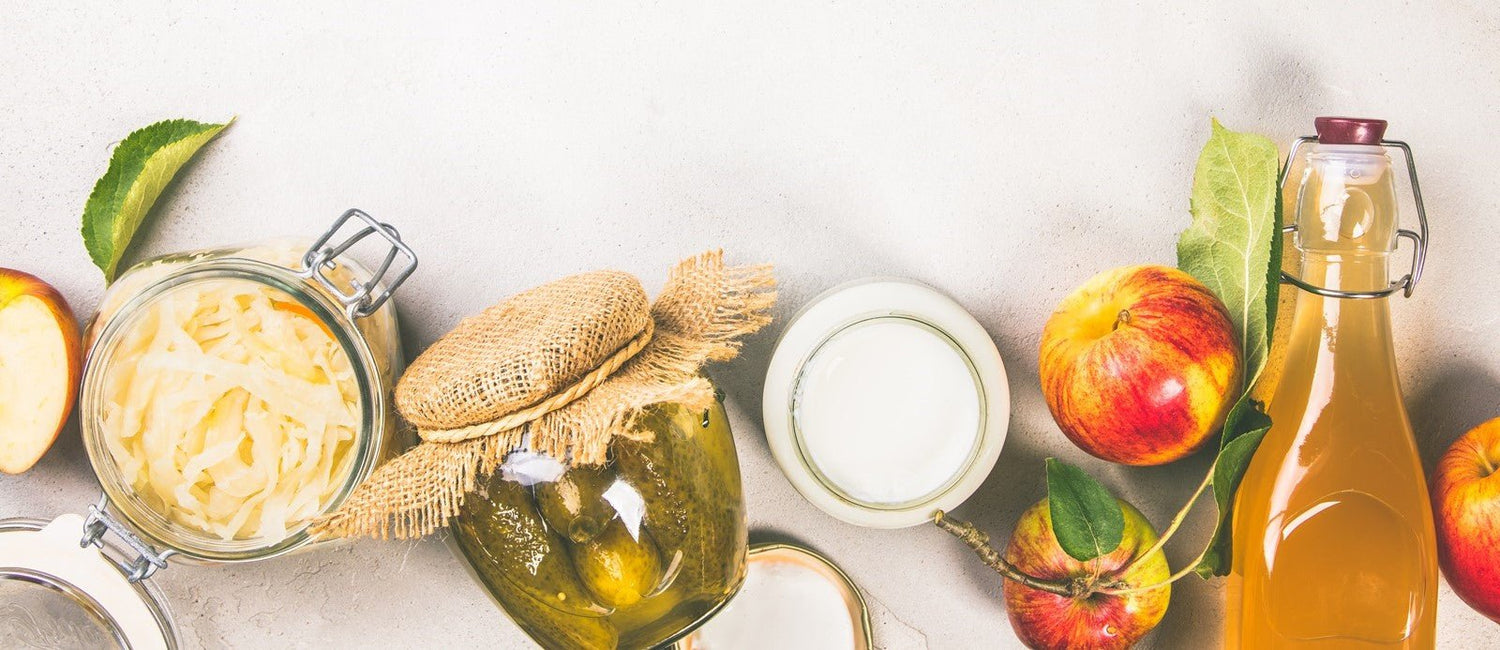Table of contents
- What is a plant-based diet?
- A plant-based diet increases your good gut bacteria
- Links between certain foods and types of “good” bacteria
- To nourish your gut, eat your vegetables and avoid processed foods and added sugars
- Other benefits of a plant-based diet
- Our recommendation for a healthy gut microbiome
A plant-based diet is associated with many health benefits and can counteract diseases such as high blood pressure, diabetes, cardiovascular disease and obesity (1). But how do gut microbiome and plant-based foods actually get along? Let’s first look at the difference between a plant-based diet and a vegan diet.
What is a plant-based diet?
Although there are slightly different approaches, a plant-based diet focuses on foods from plant sources and preferably as a whole food diet. This doesn’t necessarily mean that you completely avoid animal products, as with a vegan diet, but simply that you prioritise the consumption of plant-based foods. And right away: We at myBioma do not recommend a vegan diet, but we do consider a plant-based wholefood diet to be very sensible. Besides fruits and vegetables, legumes, whole grains, nuts and seeds play an important role in this diet. And most plant-based foods are packed with gut-friendly fibre and prebiotics.
A plant-based diet increases your good gut bacteria
Recent evidence suggests that a plant-based diet feeds those gut bacteria that are associated with a lower risk of heart disease, obesity and diabetes, according to a new large-scale study. The study, published on 11 January 2021 in the Journal Nature Medicine (2), is the largest and most detailed to date looking at the gut microbiome, diet and health.
Researchers from several universities, including King’s College London and the Harvard T.H. Chan School of Public Health, examined extensive data from 1,098 healthy adults in the UK and US, including long-term dietary information, pre- and post-meal blood tests, and samples of their stool to analyse gut bacteria. They found strong links between certain diets, certain types of bacteria and good health.
 A plant-based diet increases your good gut bacteria
A plant-based diet increases your good gut bacteria
“This study demonstrates a clear association between specific microbial species in the gut, certain foods, and risk of some common diseases.” Andrew T. Chan
Links between certain foods and types of “good” bacteria
For instance, the results show that a microbiome rich in Prevotella copri and Blastocystis species was associated with maintaining favourable blood glucose levels after a meal. Other species were associated with lower blood lipid levels and inflammatory markers after a meal.
The researchers found that subjects who ate diets rich in healthy, plant-based foods were more likely to have high levels of “good” gut bacteria. Conversely, diets that contained more highly processed, plant-based foods were more likely to be associated with ‘bad’ gut microbes.
“As a nutritional scientist, finding novel microbes that are linked to specific foods, as well as metabolic health, is exciting. Given the highly personalised composition of each individuals’ microbiome, our research suggests that we may be able to modify our gut microbiome to optimize our health by choosing the best foods for our unique biology.”
Dr. Sarah Berry, Reader in Nutrition Sciences, King’s College London
To nourish your gut, eat your vegetables and avoid processed foods and added sugars
Although there is still much to explore in the area of the gut microbiome, this latest study adds to the wealth of scientific evidence showing the health benefits of a plant-based diet. Scientists have already found in a paper published in the British Medical Journal that a high intake of plant-based proteins such as legumes, whole grains and nuts is associated with a lower risk of a number of diseases, including diabetes, heart disease and stroke. (3)
“When you eat, you’re not just nourishing your body, you’re feeding the trillions of microbes that live inside your gut..”
Tim Spector, Epidemiologist, KCL
Another study, led by the National Cancer Institute in the US, found an “inverse association” between higher consumption of plant-based foods and heart disease mortality rates. The most striking inverse associations were found when plant proteins were substituted for eggs and red meat. (4)
Other benefits of a plant-based diet
In addition to supporting human health, plant-based proteins are also more environmentally friendly. A 2019 Oxford University study found that healthy plant-based foods are almost always associated with a smaller carbon footprint. (5)
Looking for inspiration of plant-based recipes? Check out our baked sweet potatoes with tahini yoghurt. Of course we also have other recipes to support a healthy gut microbiome.
Our recommendation for a healthy gut microbiome
The key to building a healthy gut microbiome seems to be eating mainly nutrient-dense, whole plant-based foods, but also avoiding processed foods, refined starches and oils, and added sugars. Of course, in addition to diet, adequate exercise, restful sleep , stress reduction are also very important. Now if you want to find out how your personal gut microbiome is doing, you can do a health check at home with myBioma.
“These are all things that probably your grandparents told you. What’s happening right now is we’re trying to understand why those things are true.” Rob Knight, professor at the University of California, San Diego, and co-founder of the American Gut Project
Note
This article is intended for informational purposes only and should not be construed as medical information or instructions. The recipes are intended for inspiration and are not intended as therapeutic measures. If you have any health problems, we recommend that you contact a doctor or other expert immediately.
References
- Tuso PJ, Ismail MH, Ha BP, Bartolotto C. Nutritional update for physicians: plant-based diets. Perm J. 2013 Spring;17(2):61-6. doi: 10.7812/TPP/12-085. PMID: 23704846; PMCID: PMC3662288.
- Hall, K.D., Guo, J., Courville, A.B. et al. Effect of a plant-based, low-fat diet versus an animal-based, ketogenic diet on ad libitum energy intake. Nat Med (2021). https://doi.org/10.1038/s41591-020-01209-1
- Naghshi S, Sadeghi O, Willett WC, Esmaillzadeh A. Dietary intake of total, animal, and plant proteins and risk of all cause, cardiovascular, and cancer mortality: systematic review and dose-response meta-analysis of prospective cohort studies. BMJ. 2020 Jul 22;370:m2412. doi: 10.1136/bmj.m2412. PMID: 32699048; PMCID: PMC7374797.
- Huang J, Liao LM, Weinstein SJ, Sinha R, Graubard BI, Albanes D. Association Between Plant and Animal Protein Intake and Overall and Cause-Specific Mortality. JAMA Intern Med. 2020;180(9):1173–1184. doi:10.1001/jamainternmed.2020.2790
- Clark MA, Springmann M, Hill J, Tilman D. Multiple health and environmental impacts of foods. Proc Natl Acad Sci U S A. 2019 Nov 12;116(46):23357-23362. doi: 10.1073/pnas.1906908116. Epub 2019 Oct 28. PMID: 31659030; PMCID: PMC6859310.





